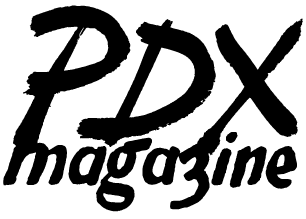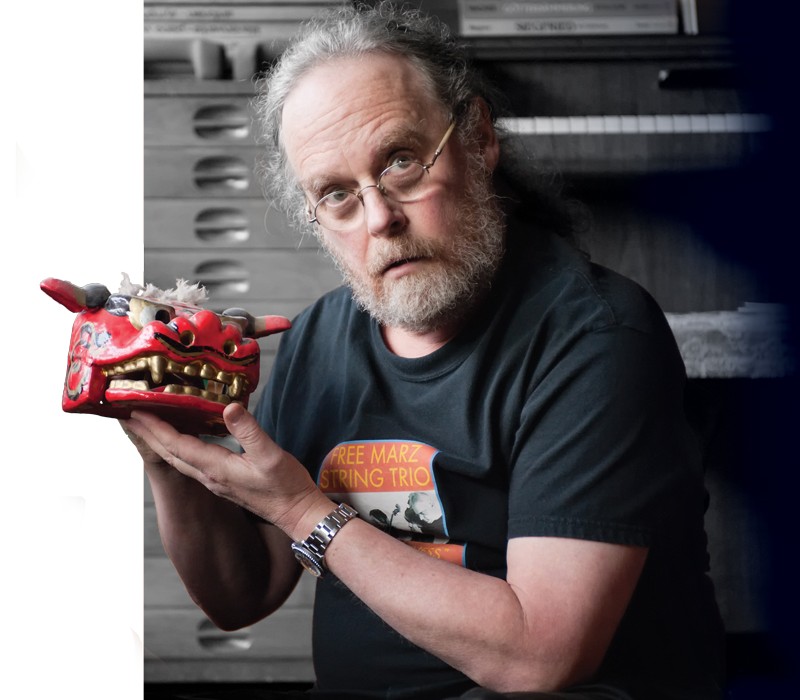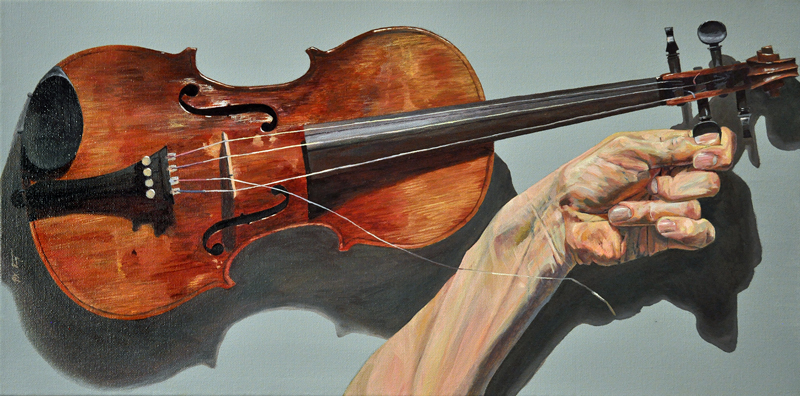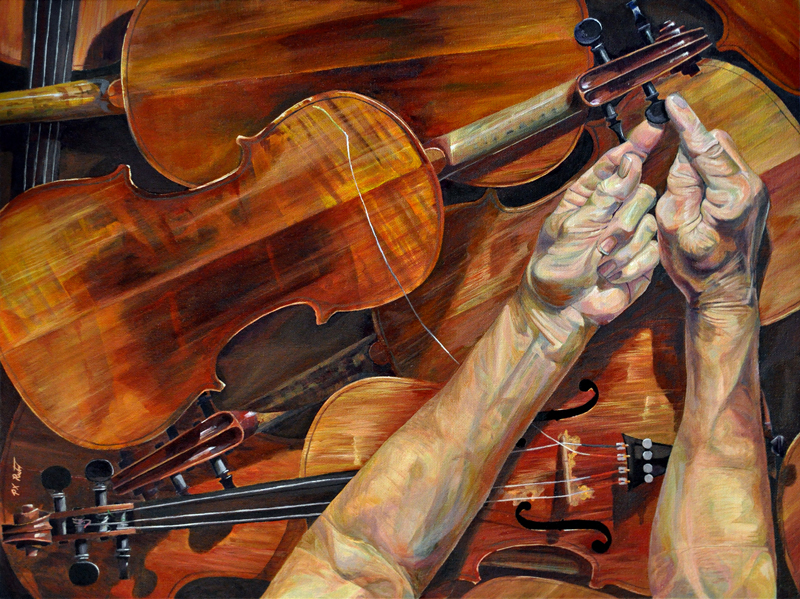By Christopher Corbell
Photo by Chris Leck
Bob Priest is an avant-impresario in hippie-zen clothing, a champion of noise and synesthesia giving his all to keep Portland’s rainy spring soaking in modern sounds. He’s the founder and organizer of March Music Moderne, Portland’s prolific and densely packed contemporary-classical music festival. I met Bob near his downtown abode on a late February night to talk about his background as well as the history and gist of the event.
Christopher Corbell: How did the idea of March Music Moderne germinate?
Bob Priest: The inspiration came from the Warsaw Festival in 1980, which I was invited to attend by Polish composer Witold Lutoslawski, whom I had met earlier. I had never seen anything like it: the variety of music, the global talent that they brought in…
CC: Who were some of the artists?
BP: Pianist Stanislav Richter was there, and Oleg Kagan—probably the best violinist I’ve ever seen in my life. Yuri Bashmet, the superstar viola player, Heinz Holliger the great Swiss oboist and composer. Alfred Schnittke was there, it was my first exposure to his music. There were so many others, it was just amazing.
CC: How did your connection with Lutoslawski come about?
BP: I was living in Hamburg—I lived there for about three months—and I wrote him a fan letter, telling him how much I loved his music and asking if I might meet with him. He wrote back and said, “Oh, thank you for your letter,” and “Yes, I would be happy to meet you,” and he gave me a list of the cities he’d be in for the next several months. On the list I saw Oslo, which is not too far from Hamburg, and I’d always wanted to see the Munch Museum. That’s where I met him, in December ’79, and I spent an evening there showing him my scores and getting some advice. He said, “I’d like to invite you to the Warsaw Festival, I think you’d really get a lot out of it.” Little did he realize!
CC: It’s cool that you were able to make that individual connection.
BP: I learned that really early. Growing up in Los Angeles, I was a big Giants fan and I loved Willie Mays; he was my absolute hero. I just casually said to my mom one day: Hey, when the Giants come to town, is there any way could I meet Willie Mays? She said “I’ll find out where they stay.” And sure enough, the next time they came to town, we went to the Ambassador Hotel. It was 1960—she just got on the house phone and asked to be connected to Willie Mays’ room. He answered, and she explained that her eight-year-old son worshipped the ground he walked on and would really like to meet him, and he said, “Sure, come right over to my bungalow.” So there I was: sitting on the bed with my baseball and mitt hanging out with Willie Mays!
It gave me the chutzpah to get in contact with people that mean something to me. If you want to study with someone, or want to let them know you admire his or her work, just go for it!
That’s how I ended up studying with Olivier Messiaen: I wrote him a letter. Same thing with Lutoslawski, same thing with John Corigliano.
CC: So would you say don’t bother with the bureaucracy, just go straight to the source?
BP. Fuckin’ A! (Laughs). That’s right.
Another example of that was when Cream came to LA in 1967: I managed to get Eric Clapton on the phone and said “Hey, I really like your work, man, any chance of coming over and saying hi?” And he said, “Sure, come on over for lunch tomorrow.”
CC: The sixties were really important for you, musically?
BP: Yeah, Jimi Hendrix is at my musical core; he’s central to me. I saw him in concert four times. It was an experience you felt totally, in your whole body. I’m really interested in synesthesia. That’s why so much of the music in March Music Moderne also has dance or visual elements.
And that’s what so much of the music of that time was about. Back then, my girlfriend and I would toke up and listen to all of these fantastic records, and it was a whole sensory experience. My relationship to classical music came with a recording of Debussy’s “Prelude to the Afternoon of a Faun.” I added that record to our playlist and it was there in the rotation with the rest of the records, in the same flow.
Then she and I went to see Kubrick’s 2001 in Cinerama with the amazing sound system. I was just so overwhelmed by the whole thing that literally the next day I went to Phil Harris records and bought a copy of György Ligeti’s Requiem and Lux Aeterna, the pieces that are in the movie. I put the record on and… (His jaw drops). I just started absorbing that world. That was my first experience with contemporary classical music, unless you include Debussy.
Ligeti was and is my man. I still deeply love his music, and actually got to meet him at Hamburg as well.
Now people call me a “high modern,” because I love the music of composers like Lutoslawski, Ligeti, Xenakis.
CC: What’s the connecting thread between Hendrix and a composer like Xenakis?
BP: Oh, I think Hendrix and Xenakis have a lot of similarity! There’s an immediate tactility, a physical impression of their music on the body. It’s music of the gut, heart, and mind all at once. It’s a full-frontal sonic engagement.
I remember when I saw Jimi all those years ago, you could literally feel it in your chest—I mean, he played really, really loud. You could just about bite into the sound. And Xenakis has that in common. Most of his pieces are written at the upper threshold of the dynamic range of possibilities, and when he masses a hundred players it’s an overwhelming experience to hear live. I wish we could mount more of it because it really is an immersive experience.
CC: You’re a guitarist as well? I read you had a master class with Andrés Segovia.
BP: Yes, though these days I’m not an active player.
The class with Segovia was at North Carolina School of the Arts, where I studied guitar. I was sick the day of the class and almost didn’t go, but my girlfriend said if I didn’t go I’d forever regret it, so I went. She was right!
I’m really shaken at the recent news that Paco de Lucía is gone. He was such a tremendous person, a hero to me. I feel kind of orphaned by his passing. He was just 66.
I first saw Paco live in 1973. I was able to meet him in Vancouver, BC in 2001—what a thrill, after all those years with his records, to be right there in the dressing room. He warmed up the same way Pepe Romero used to warm up, with a rag in the strings to increase the tension, playing slow arpeggios
I’m dedicating this year’s festival to him.
CC: When I look at this year’s March Music Moderne schedule there’s quite a range, from Bartok to Xenakis to Lou Reed, and a great representation of local composers.
BP: I look for elements to tie everything in. This year the tango form is one element that emerges—music of Piazzolla in Lake Oswego on March 12, the Oregon Symphony’s Tango Caliente on the 16th.
The Satie Tango Project includes nine different pieces by different composers, but they all begin and end with an excerpt from Satie’s “Le Tango, Perpétuel.” So the idea of the perpetual tango is there, as one piece leads to the next, but the pieces are very different. This is part of the Free Marz String Trio concert on the 16th.
CC: Why is Portland a good city for March Music Moderne, a festival which pushes the boundaries of musical experience? Do we get the “synesthesia” thing?
BP: You bet! We’re all about it here. I’ve lived a lot of places in the world and I feel that Portland has something of every place I’ve been. I’m 62, and this is where I’m making my final stand!
I’ve always thought of this as a global event. That’s the Warsaw Festival influence again. We have local artists and composers and also bring in what’s going on globally. That’s why our tagline says Global Village PDX.
CC: Can you tell me about the MMM Mascot? Who is that guy?
BP: His name is Charles W. C. Johnson, and he was a musician, dance instructor, inventor, and a miner! He looks kind of old-fashioned—from the 1890s—but as I kept considering this picture, I thought: He’s playing this contraption he designed himself, totally DIY, finding us own weird sound, using ingenuity. That’s modern! That’s what we’re doing in Portland.




March Music Moderne: An interview with founder Bob Priest | March Music Moderne
[…] —Christopher Corbell, PDX Magazine (read the full article) […]